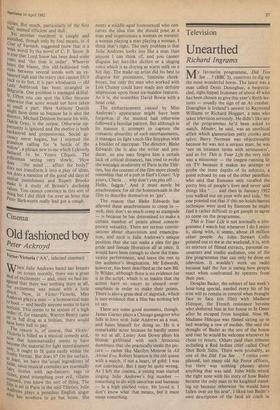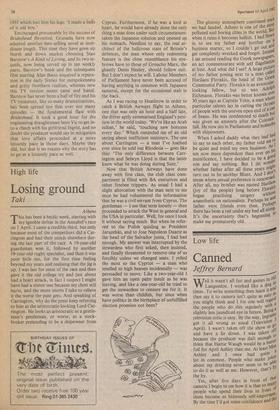Television
Unearthed
Richard Ingrams My favourite programme, Did You See ..? (BBC 2), contrives to dig up the most wonderful bores. The latest was a man called Denis Donoghue, a bespecta- cled, tight-lipped Irishman of about 45 who has been chosen to give this year's Reith lec- tures — usually the sign of an Al crasher. Donoghue is Ireland's answer to Raymond Williams or Richard Hoggart, a man who takes television seriously. He didn't like any of the programmes he'd been asked to watch. Minder, he said, was an unethical affair which glamourises petty crooks and spivs; Barry Norman was objectionable because he was not a serious man, he was 'not on intimate terms with seriousness', and as for This is Your Life the very title was a misnomer — the longest-running lie on TV because it makes no attempt to probe the inner depths of its subjects, a point echoed by one of the other panelists Who said that Eamonn only recalled the pretty bits of people's lives and never said things like ... and then in January 1952 you walked out on your wife and kids.' No one pointed out that if this no-holds-barred technique were used by Eamonn he might find it rather difficult to get people to agree to come on the programme.
This is Your Life is not normally a pro- gramme I watch but whenever I do I enjoy it, along with, it seems, about 18 million other people. As John Stewart Collis pointed out to me at the weekend, it is, with its mixture of filmed extracts, personal en- counters and studio audience, one of the few programmes that can only be done on television. It wouldn't work on radio because half the fun is seeing how people react when confronted by spectres from their past.
Douglas Bader, the subject of last week's hour-long special, needed every bit of his iron will to remain in control when brought face to face (on film) with Madame Hiecque, the French resistance heroine who sheltered him in her house in St Omer after he escaped from hospital. Now 98, Madame Hiecque was filmed sitting up in bed wearing a row of medals. She said she thought of Bader as the son of the house and that he would be welcome whenever he chose to return. Others paid their tributes including a Red Indian chief called Chief Shot Both Sides. There were probably, as one of the Did You See .. ? critics com- plained, too many old Air Force officers, but there was nothing phoney about anything that was said. John Mills struck the right note with his story of how Bader became the only man to be knighted stand- ing up because otherwise 'he would have fallen over on his arse'. I liked too Bader's own description of the fatal air crash in
1931 which lost him his legs: 'I made a balls of it old boy.'
Encouraged presumably by the success of Brideshead Revisited, Granada have now adapted another best-selling novel at inor- dinate length. This time they have gone up North and down market choosing Stan Barstow's A Kind of Loving, and its two se- quels, now being served up in ten weekly parts. Barstow's book and the subsequent film starring Alan Bates acquired a reputa- tion in the early Sixties for outspokenness and gritty Northern realism, whereas now this TV version seems tame and banal. Barstow has never been a ball of fire and his TV treatment, like so many dramatisations, has been spread too thin over too many episodes — the fundamental flaw with Brideshead. It took a good hour for the engineering draughtsman hero Vic to get in- to a clinch with his girlfriend Ingrid, and no doubt the producer would say in mitigation that love affairs proceeded at a more leisurely pace in those days. Maybe they did, but that is no reason why the story has to go at a leisurely pace as well.



































 Previous page
Previous page